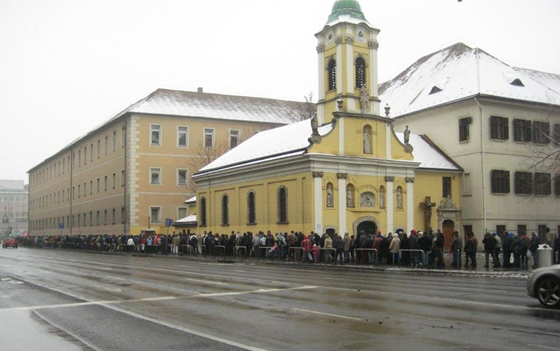7 Reasons I Am Leaving Hungary
7 ok, amiért elhagyom Magyarországot - a CIVILHETES olvasói tisztában vannak a magyarországi helyzettel, számukra nem sok újdonságot tartalmaz az alábbi írás. Éppen ezért, most angol nyelvű tartalmat jelentetünk meg, hogy a magyarul nem tudó, de Magyarország iránt erdeklődök is megismerjék, betekinthessenek az Orbáni-világba.
In 1956, my father left Hungary after the Soviets had cracked down on the revolution. He wasn’t involved in the fighting; he chose to leave for a prospect of a better life under a non-Communist regime.
In 1976 my mother chose to leave Hungary after having met my father. They met during one of his visits to Hungary, and when they decided to live together, they chose to live in Norway.
I grew up in Norway, but I wanted to study in Hungary. I loved Budapest for its architecture, its many art cinemas, the theaters, and my new friends.
After university, I found work at one of the many shared service centers (SSC) run by multinational companies. This was in 2008, and despite the economic crisis and an inept Socialist government, many had high hopes for better times ahead. Being no fan of Viktor Orbán’s Fidesz party, I naively believed that at least their economic policy would be better, if not perfect. I used to believe that I could have a future in Hungary, even if I never make as much money as I would in Norway. I was willing to make that trade-off for living in an exciting city in the middle of Europe. Being part of an emerging economy, many of us believed that in the long run wages and living standards would rise for most Hungarians.
Today, Budapest has become a depressing place to live, many of the art cinemas have closed. Some theaters have been taken over by directors loyal to Fidesz, usually as a result of a rigged hiring process, chasing away talented people. Old, beautiful buildings are still crumbling, and poverty is more visible than ever.

Queue for a soup kitchen before Christmas, 2015 – Budapest
The state is more interested in enriching politicians and oligarchs close to Prime Minister Orbán, than making life easier for its citizens. While infrastructure used by ordinary citizens is literally rotting away, the government spends on lavish projects like stadiums and governmental buildings.
This is Orbán’s pet project, a narrow-gauge railroad in his hometown, Felcsút (left) – compared to a major railway station downtown Budapest (right):


A massive stadium and football academy next to Orbán’s birth house in Felcsút (left) and from drone (right) – built with public funds.


Orbán is also moving his office to Buda Castle at a massive cost. In order to have his own balcony, a UNESCO-protected site is being remodeled.

Orbán’s office being built in Buda castle
For ordinary people low wages, high taxes, and rampant corruption have become an obstacle to a decent life, and many of my friends and colleagues have chosen to emigrate.
There is no real opposition today, while Fidesz and the far-right Jobbik still enjoy strong support. The decline may not have begun with Viktor Orbán, and he cannot be blamed for all the problems in the post-communist era, but his government is responsible for the current decline – after having been in power for six years.
For eight years my taxes have supported corrupt politicians and a state that increasingly fails to provide basic services.
Hungary is not a dictatorship anymore, but forty years after my mother left, I am leaving for similar reasons:
- I want to live in country where I’m treated as a citizen – not as a subject.
- Where people’s success depends on talent and hard work – not political connections.
- Where state funds are used to secure efficient public services – not the wealth of the elite.
- I want to live in a country were people, who work hard and follow the rules don’t have to struggle to make ends meet.
- Where crime is prosecuted regardless of the political connections of the suspect.
- Where policy is decided through open debate, and not by whatever the country’s leader happens to think on that given day.
- Where Western values are the norm and Moscow is not a role model for government.
Here are my own personal reasons of leaving Hungary:
1. Low Wages – Long Working Hours
While Hungarians work more hours than most – at least on paper – they are paid less than most Europeans. Hungary ranks 7th in hours worked among OECD countries.
If you live in Budapest, you have to work longer for your Big Mac than most of your peers in the neighboring capitals – including Sofia, Prague, Warsaw, and Bratislava. Only the guy in Bucharest has to work longer (0.3 minutes) for his lunch at McDonald’s – if we believe the statistics. Small comfort.
For me, it meant that I couldn’t afford a decent lifestyle on an above average salary – by which I mean eating out once in a while, going on a holiday, or purchase books while also saving for a rainy day. For many Hungarian families going out for a movie and a snack is a rare treat even with full time jobs.
2. High taxes and a lousy welfare state
Hungarian taxation of wages is among the highest in the EU – Hungary is surpassed only by Belgium, Austria, and Germany. Needless to say, there is a difference between services provided by the German and the Hungarian state. In Hungary you have to bribe the doctor and hospital staff if you want a relatively decent health care service. Or you can opt for private health care, out of your own pocket.
In a country, where the net average wage is around 500 euros per month, this is not a realistic option for most people.
3. The M3 metro line in Budapest
This is how the metro line I used to take to work looks like:

There is no air conditioning and 30 degrees Celsius is common inside the trains. Most of these wagons were built in the seventies, and some of them have actually caught fire during service.
4. National Tobacco Stores

A National Tobacco Store. The graffiti reads: “Don’t take us for fools!” Photo: 444.hu
Budapest is littered with so called National Tobacco Stores – they are exclusively licensed to sell tobacco products. These are one of the many corruption scandals linked to the Orbán-government. A Fidesz mayor was caught on tape deliberating who is worthy of license in his town – based on loyalty to Fidesz. As a result, many shop owners have lost their businesses. The chief prosecutor – nominated by Fidesz – declined to investigate. If you purchase something in one of these shops you are supporting a business of cronies.
Personally, I am disgusted every time I see one of these shops – for me they are a symbol of government-sponsored robbery and corruption.
By the way – the Orbán-government loves to name all things Nemzeti (national) probably because it makes them look patriotic.
5. Political propaganda financed with public money
Big poster signs of immigrant-bashing and anti-Brussels messages financed with public funds can be seen everywhere.

Ever since the migration crisis hit Hungary last summer, Orbán has competed with the far-right Jobbik party for the nationalist votes. This is also a useful tool for avoiding to talk about the dismal state Hungary is currently in (see previous comments).
The public broadcaster is churning out propaganda masqueraded as news. One case tells it all: Dániel Papp, a journalist working for the public broadcaster falsified a report with the intent to embarrass a foreign critic of Orbán. When he was exposed, instead of getting the sack, he was promoted. (But at least it’s now legal to call him a news falsifier (hírhamisító) because he lost a court case against it.
The state broadcaster’s new coverage of the recent teachers’ protest wasbiased, portraying the demonstrators as stooges for the opposition – which in Fidesz’s world view means ‘serving foreign interests’.
6. Crony capitalism
One of the major oligarchs is Lajos Simicska. He used to be friends with Viktor Orbán, their relationship goes back decades. Before falling out with Orbán, Simicska used to win major government contracts and tenders. The reason behind his success was that the government wanted to create Hungarian capitalists – Hungarians with capital. Now that Simicska and Orbán are not friends anymore, his companies are apparently not Hungarian enough for the state. There are new winners – from among Orbán’s friends and family.
A company owned by Orbán’s son-in-law, for instance, has won major contracts for street lights in cities run by Fidesz. As the Hungarian Spectrum writes:
“work in Zalaegerszeg, which seems to have been less than satisfactory. In some parts of the city it is pitch dark, while in others pedestrians have difficulty navigating because the streetlights shine only on the road, leaving the sidewalks practically unlighted.”
This is a video from a mid-sized town after they equipped it with new street lights. It is a ride downtown, not in the outskirts. Pedestrians are not visible, zebra crossings caused accidents in the days after the new lights went up. Eventually, traffic cops had to be stationed at zebra crossings to escort pedestrians across the street.
The biggest problem with crony capitalism and corruption in Hungary is that the products are substandard and overpriced. Decent businesses lose while a few oligarchs are enriched and so called intellectuals funded by the taxpayers create an ideology, wanting us to believe that all this is for the good of the nation.
7. The so-called democratic opposition – the pillars of Orbán’s illiberal state
When Fidesz rewrote the election laws before the 2014 general election, it was clear that it favored the ruling party. And Fidesz did indeed win a 2/3 majority, while obtaining less the 50% of the popular vote. If I remember correctly, the opposition held a press conference, where the socialists’ and their allies’ key message was to join forces in order to beat Fidesz. While their rhetoric claimed that this was almost a dictatorship, they behaved like it was still a liberal democracy.
By opting to stay in the parliament and participate in elections under the rules written by Fidesz, they continue to legitimize Orbán’s state. With their cooperation it’s almost guaranteed that Fidesz will “win” the next general election and nothing will change in the near future.




















